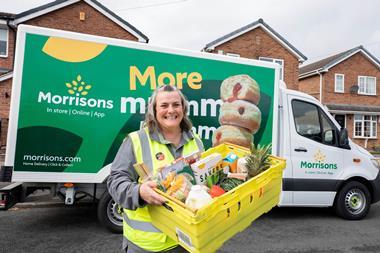This is real politics, with MPs stirring. After decades of backing the Conservatives, boards must be happy that they became born-again New Labour just in time. This is not about favours being called in, but contacts and PR.
There are four key policy challenges. First there is a clear choice of business styles. In one corner you have the homespun UK regional player, Morrisons, bidding to go national. Then there are national players, one southern-based patrician, Sainsbury; the other pile it high, sell em cheap' turned suave market leader, Tesco.
From abroad, there's the US-based colossus, Wal-Mart, with its UK fascia, Asda, alongside the finance capital carve-up team, KKR, with a UK outsider, Philip Green, eyeing assets. Armies of under-employed City advisors, lawyers, arbitrageurs, bankers, analysts, etc, salivate over plans, advice and strategies.
Second, there is government's role in competition policy. It has this one last chance to intervene before the Competition Commission and Office of Fair Trading are made more independent'.
Competition policy is being narrowed just when it ought to include social, environmental and health criteria. Why have governments chosen not to act on these occasions?
The ending of retail price maintenance unleashed three decades of retail concentration, a process now reaching climax. Although welcomed then for curtailing the power of the big processors, maybe now the public needs a champion to curb the retail barons in turn.
Government rhetoric about the food system being international, competitive and efficient is too trite.
What sort of food economy do we want? Is government prepared to give it a steer like the US, French and Germans are? Is concentration to be defined locally, regionally, nationally, or in European and global terms?
I am still amazed that Tesco has been allowed to go over the 25% national market share without a squeak. That used to be a trigger for a monopoly inquiry. In some regions, Tesco and Sainsbury are well over that already.
The third big policy question is what is retailing for to serve consumers or get consumers to serve themselves? The notion of consumer benefit requires a review itself. Too much attention has been paid to prices. They are obviously important, but they are not everything.
The UK's cumbersome authorities, after some pressure from outside, need to realise that what matters to shoppers is not only price but also travel-to-shop time, diversity and quality of life.
When the Treasury is worried about rising health costs because of lack of exercise and inappropriate diets, retailers cannot be let off the responsibility hook. They feed this culture.
Fourth, what is meant by the consumer interest? Price is no longer everything. Externalities like health impact and quality are in. The days when retailers could say public and environmental health is nothing to do with them are over. Retailing is a disproportionately heavy drag on traffic, energy consumption and people's time.
And, yes, the penny is beginning to drop compared to 30 years ago. We spend longer shopping because we cannot build shopping into our daily lives. We have to make dedicated trips.
Shopping isn't fun or exercise. It's a drudge and an ecological nightmare. To that extent, the Safeway takeover offers little choice at all.
Why isn't anyone suggesting the kind of drastic action the US authorities exerted on the telephone monopolies a decade or so ago? Break them up.
Now that would set the cat among the policy pigeons.
{{COMMENT - GUEST }}
There are four key policy challenges. First there is a clear choice of business styles. In one corner you have the homespun UK regional player, Morrisons, bidding to go national. Then there are national players, one southern-based patrician, Sainsbury; the other pile it high, sell em cheap' turned suave market leader, Tesco.
From abroad, there's the US-based colossus, Wal-Mart, with its UK fascia, Asda, alongside the finance capital carve-up team, KKR, with a UK outsider, Philip Green, eyeing assets. Armies of under-employed City advisors, lawyers, arbitrageurs, bankers, analysts, etc, salivate over plans, advice and strategies.
Second, there is government's role in competition policy. It has this one last chance to intervene before the Competition Commission and Office of Fair Trading are made more independent'.
Competition policy is being narrowed just when it ought to include social, environmental and health criteria. Why have governments chosen not to act on these occasions?
The ending of retail price maintenance unleashed three decades of retail concentration, a process now reaching climax. Although welcomed then for curtailing the power of the big processors, maybe now the public needs a champion to curb the retail barons in turn.
Government rhetoric about the food system being international, competitive and efficient is too trite.
What sort of food economy do we want? Is government prepared to give it a steer like the US, French and Germans are? Is concentration to be defined locally, regionally, nationally, or in European and global terms?
I am still amazed that Tesco has been allowed to go over the 25% national market share without a squeak. That used to be a trigger for a monopoly inquiry. In some regions, Tesco and Sainsbury are well over that already.
The third big policy question is what is retailing for to serve consumers or get consumers to serve themselves? The notion of consumer benefit requires a review itself. Too much attention has been paid to prices. They are obviously important, but they are not everything.
The UK's cumbersome authorities, after some pressure from outside, need to realise that what matters to shoppers is not only price but also travel-to-shop time, diversity and quality of life.
When the Treasury is worried about rising health costs because of lack of exercise and inappropriate diets, retailers cannot be let off the responsibility hook. They feed this culture.
Fourth, what is meant by the consumer interest? Price is no longer everything. Externalities like health impact and quality are in. The days when retailers could say public and environmental health is nothing to do with them are over. Retailing is a disproportionately heavy drag on traffic, energy consumption and people's time.
And, yes, the penny is beginning to drop compared to 30 years ago. We spend longer shopping because we cannot build shopping into our daily lives. We have to make dedicated trips.
Shopping isn't fun or exercise. It's a drudge and an ecological nightmare. To that extent, the Safeway takeover offers little choice at all.
Why isn't anyone suggesting the kind of drastic action the US authorities exerted on the telephone monopolies a decade or so ago? Break them up.
Now that would set the cat among the policy pigeons.
{{COMMENT - GUEST }}



















No comments yet